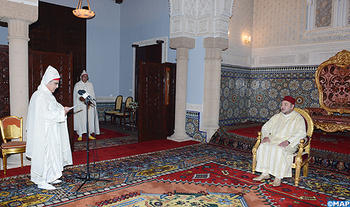


In a speech given before His Majesty the King, Jouahri said that the national economy recorded a growth rate of 2.7 pc in 2012, amid a global economic recession and unfavorable domestic weather conditions.
He explained that the growth reflects the performance of the services sector and the relative improvement of domestic demand owing to an expansionary fiscal policy and a moderate inflation which remains below 1.3 pc despite the increase in fuel prices in June 2012.
Regarding the labor market, he said that the unemployment rate has stabilized at 9 pc despite an almost zero net job creation.
Jouahri noted that 2012 was a difficult year both for public finances and balance of payment.
He said the fiscal deficit continued to widen reaching 7.6 pc of GDP, due to the increase in expenses, mainly subsidy costs, while the balance of payment current account further deteriorated, with a 10 per cent deficit, causing foreign exchange reserves to fall.
Regarding monetary policy, Jouahri said that, in a context subdued inflationary pressures and slowdown in economic activity and bank credit, Bank Al Maghrib continued accommodative monetary policy, marked in particular by lowering the key rate 3 pc and the required reserve ratio to 4 per cent, while adjusting the volume of liquidity injections to market needs.
The Central Bank has also strengthened prudential requirements for the domestic banking sector in line with international standards, he added.
The Wali of Bank Al Maghrib, also said that despite the difficult economic environment, Morocco continued to enjoy the confidence of its partners and international investors, as evidenced by its subscription to the Precautionary and Liquidity Line of the International Monetary Bank and the favorable conditions of the last two Treasury issues on the international market.
He underscored that this reflects the policy initiatives and institutional reforms launched by HM the King, consolidated in 2011 with the constitutional revision that has enshrined Morocco's democratic choice.
He underlined that overcoming the challenges facing our country today requires accelerating the pace of reforms and widening their scope within the implementation of the new constitution and achieving the structural projects underway.
He emphasized that it is also necessary to restore macroeconomic stability and ensure fiscal sustainability, which imply in particular an overhaul of the subsidy policy, the pension funds, the tax system and the organic law on finance.
Finally, he affirmed that the central bank will spare no effort to contribute to the success of these projects, mostly by ensuring adequate funding of the national economy, especially for micro-businesses and SMEs, and improving access to and quality of banking services.